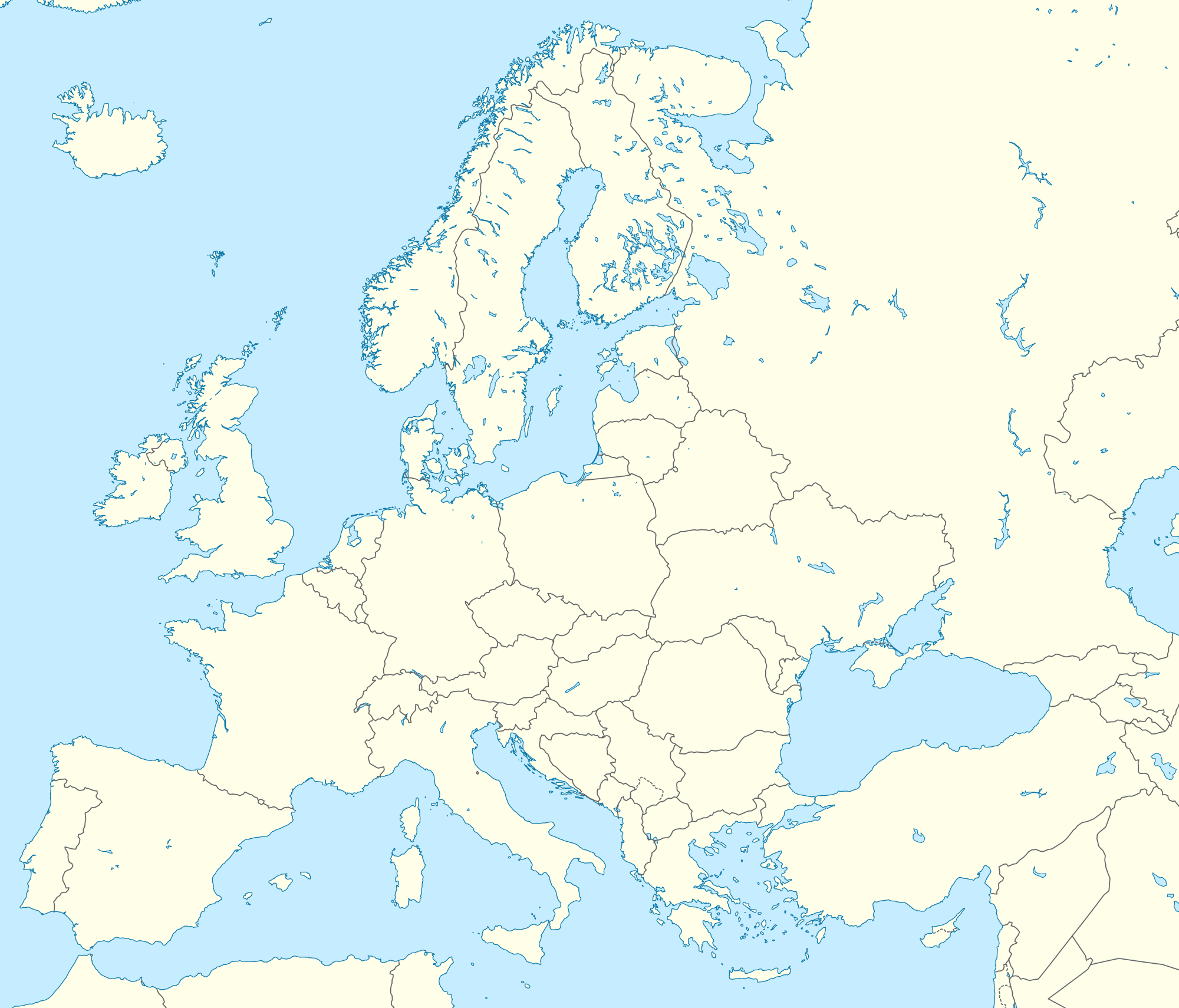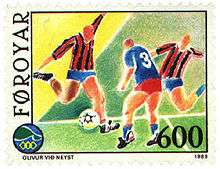Island Games
The Island Games (currently known as the NatWest International Island Games for sponsorship reasons) are an international multi-sports event organised by the International Island Games Association (IIGA). Competitor teams each represent different island communities (with one team from the peninsula of Gibraltar) which are IIGA members. Currently all competitor teams represent non-sovereign territories of European nations - some within European waters and some further overseas.
| Island Games | |
|---|---|
| Genre | Multi-sports event |
| Frequency | Biennial |
| Location(s) | Various |
| Inaugurated | 1985 |
| Most recent | 2019 Island Games |
| Next event | 2021 Island Games |
| Participants | ~ 2,000 |
| Organised by | IIGA |
| Sponsor | NatWest International |
| Website | Official IIGA website |
The most recent edition was 2019 which took place in Gibraltar, with around 2,000 competitors from 22 competing islands or island groups competing in 14 sports. The next games will be hosted by Guernsey in 2021.

History
The Island Games began in 1985 as the Inter-Island Games, as part of the Isle of Man International Year of Sport, and were intended to be a one-off sporting celebration only. Geoffrey Corlett, who became the first Games Director, not only contacted the islands surrounding the United Kingdom, but also encouraged the countries of Iceland and Malta, the territories of Faroe Islands, Greenland, Saint Helena, the Channel Islands and others to participate.
Initially, fifteen islands with 600 competitors and officials took part in seven sports,[1] with the total cost of staging the Games being put at £70,000. The track and field events were held on an eight-lane grass track, a far cry from the current games, which now use synthetic tracks in stadiums capable of holding thousands of spectators. The Games of 1985 were so successful that organisers decided to hold a similar event two years later.[2] The games have grown from strength to strength with limits now in place over the number of teams, currently 23 and the number of sports at each games, currently 12–14. Sark could be considered the most successful island, their population of 600 having acquired 20 medals by 2015, one for every 30 people.
NatWest International has been the main sponsor of the games since 1999. In April 2018, they signed a deal extending their sponsorship until at least 2021.
Game venues


| Year | Games | Host Island | Participating Islands |
Athletes | Sports |
|---|---|---|---|---|---|
| 1985 | I | 15 | 700 | 7 | |
| 1987 | II | 18 | 1,049 | 9 | |
| 1989 | III | 15 | 800 | 11 | |
| 1991 | IV | 17 | 1,500 | 13 | |
| 1993 | V | 19 | 1,448 | 14 | |
| 1995 | VI | 18 | 1,214 | 13 | |
| 1997 | VII | 20 | ~2,000 | 13 | |
| 1999 | VIII | 22 | 1,858 | 14 | |
| 2001 | IX | 22 | 2,020 | 15 | |
| 2003 | X | 23 | 2,129 | 15 | |
| 2005 | XI | 24 | 1,658 | 14 | |
| 2007 | XII | 25 | 2,343 | 14 | |
| 2009 | XIII | 24 | 2,286 | 14 | |
| 2011 | XIV | 24 | 2,311 | 14 | |
| 2013 | XV | 22 | 1,296 | 14 | |
| 2015 | XVI | 24 | 2,430 | 14 | |
| 2017 | XVII | 23 | 2,333 | 14[4] | |
| 2019 | XVIII | 24 | 1,700 | 14[8] | |
| 2021 | XIX | 24 | ~3,000 | 14 | |
| 2023 | XX | 13 |
Guernsey put in a bid for the 2021 games following the Faroe Islands' withdrawal from hosting.[11] The bid was approved in July 2016.
Orkney will host the 2023 Games. They were awarded the right to host on 7 July 2018 at the AGM in Gibraltar.
Ynys Môn are contemplating a bid for the 2025 games,[12] the bid being mentioned by the MP for Ynys Môn in the House of Commons.[13] So are the Isle of Man.[14]
In May 2018, the Parliament of the Faroe Islands guaranteed €1,500,000 towards hosting the Games in or before 2029.[15]
In August 2018 it was reported that the Falkland Islands are considering hosting the Games in 2033, and "the Island Games Executive is planning to visit the Falklands in 2020 for their Spring Meeting" to discuss the proposition.[16]
Participation
A total of twenty-seven islands, island groups or territories have participated in the Island Games; eleven of these have participated in every Island Games.
| Island(s) | Country and status | Population | Years | Gold | Silver | Bronze | Total |
|---|---|---|---|---|---|---|---|
| 28,666 | 1985– | 157 | 172 | 155 | 484 | ||
| 1,900 | 1987, 1993– | 0 | 2 | 3 | 5 | ||
| 64,200 | 2003– | 88 | 80 | 99 | 267 | ||
| 56,700 | 1999– | 99 | 73 | 65 | 237 | ||
| 2,900 | 1993– | 1 | 7 | 11 | 19 | ||
Kingdom of Denmark |
49,700 | 1985– | 243 | 187 | 194 | 624 | |
| 4,300 | 1985– | 1 | 1 | 2 | 4 | ||
| 30,000 | 1987– | 53 | 58 | 88 | 199 | ||
| 57,200 | 1985– | 243 | 187 | 194 | 624 | ||
within the Kingdom of Denmark |
56,000 | 1989– | 17 | 21 | 27 | 63 | |
| 65,800 | 1985– | 382 | 392 | 429 | 1,203 | ||
| 4,250 | 1985–1989, 1997– | 3 | 5 | 5 | 13 | ||
| 84,500 | 1985– | 413 | 396 | 407 | 1,216 | ||
| 138,400 | 1985– | 167 | 166 | 197 | 530 | ||
| 105,500 | 1985– | 491 | 491 | 444 | 1,426 | ||
| 94,400 | 2007– | 36 | 34 | 46 | 116 | ||
| 21,300 | 1985– | 20 | 37 | 41 | 98 | ||
| 115,500 | 1999–2011, 2015 | 51 | 44 | 43 | 138 | ||
| 31,000 | 1991– | 77 | 86 | 77 | 238 | ||
| 4,250 | 1985–1987, 1997– | 1 | 2 | 3 | 6 | ||
| 600 | 1987–2011, 2015– | 3 | 9 | 8 | 20 | ||
| 23,200 | 1985– | 48 | 68 | 93 | 209 | ||
Na h-Eileanan an Iar |
27,400 | 2005– | 17 | 13 | 22 | 49 | |
| 69,700 | 1985– | 27 | 33 | 46 | 106 | ||
| 329,000 | 1985–1997 | 50 | 45 | 41 | 136 | ||
| 445,000 | 1985–1987 | 6 | 2 | 2 | 10 | ||
| 140,000 | 1991–2007 | 6 | 6 | 9 | 21 |
Islands marked in grey are no longer members of the IIGA and so cannot compete at the Island Games.
Of the 24 current IIGA members, two (Bermuda and the Cayman Islands) have competed in their own right at the Olympic Games. Bermuda, the Cayman Islands, the Falkland Islands, Gibraltar, Guernsey, the Isle of Man, Jersey and St. Helena have each sent teams to the Commonwealth Games.
Sports
The host country chooses between 12 and 14 different sports for their games from this list:
| Sport | I | II | III | IV | V | VI | VII | VIII | IX | X | XI | XII | XIII | XIV | XV | XVI | Total | XVII | XVIII | |
|---|---|---|---|---|---|---|---|---|---|---|---|---|---|---|---|---|---|---|---|---|
| Archery | 14 | |||||||||||||||||||
| Athletics | 16 | |||||||||||||||||||
| Badminton | 15 | |||||||||||||||||||
| Basketball | 8 | |||||||||||||||||||
| Bowls (Indoor‡, Outdoor, or Ten Pin*) |
3 | |||||||||||||||||||
| Cycling | 15 | |||||||||||||||||||
| Football | 15 | |||||||||||||||||||
| Golf | 12 | |||||||||||||||||||
| Gymnastics | 10 | |||||||||||||||||||
| Judo | 6 | |||||||||||||||||||
| Sailing (may include Sailboarding*) |
12 | |||||||||||||||||||
| Shooting | 16 | |||||||||||||||||||
| Squash | 3 | |||||||||||||||||||
| Swimming | 16 | |||||||||||||||||||
| Table Tennis | 14 | |||||||||||||||||||
| Tennis | 12 | |||||||||||||||||||
| Triathlon | 5 | |||||||||||||||||||
| Volleyball (may include Beach Volleyball*) |
16 | |||||||||||||||||||
| Total sports | 7 | 9 | 11 | 13 | 14 | 13 | 13 | 14 | 15 | 15 | 14 | 14 | 14 | 14 | 14 | 14 | 14 | 14 |
Notably, the Island Games' football tournament is one of the most well-established tournaments of non-FIFA international football.
Olympic athletes
Islanders who have gone on to participate in Olympic Games events include:
- Mark Cavendish (Isle of Man) — cycling (Olympic silver medal winner)
- Dale Garland (Guernsey) - 4 × 400 m
- Rebecca Heyliger (Bermuda) - swimming
- Pál Joensen (Faroe Islands) — swimming (World Championship bronze medal winner)
- Lee Merrien (Guernsey) - Marathon
- Cydonie Mothersille (Cayman Islands) — 200m (World Championship bronze medal winner)
- Kelly Sotherton (Isle of Wight) — heptathlon and 400m (Olympic bronze medal winner)
- Mattias Sunneborn (Gotland) — long jump and 200m (World Indoor Championship silver medal winner)
- Albert Torres (Menorca) — cycling[17] (World Championship gold medal winner)
Footnotes
- "Inaugural Inter-Island Games - Isle of Man 1985". iiga.org.
- "The Games". Jersey2015.com. Archived from the original on 17 January 2015. Retrieved 30 January 2015.
- "NatWest Island Games - Rhodes 2007 June 30th - July 6th". Rhodes Results 2007. Retrieved 30 April 2017.
- "2017 sports". Archived from the original on 26 August 2017. Retrieved 21 October 2015.
- James Law. "BBC Sport - Island Games: Menorca pull out of hosting 2019 event". BBC Sport.
- "BBC Sport - Island Games: Gibraltar bid to host 2019 competition". BBC Sport.
- "Guernsey to host the 2021 Island Games". IIGA.
- "2019 Island Games: Gibraltar axes football, cycling and volleyball".
- "Guernsey to host 2021 Island Games". BBC News. 2 July 2016. Retrieved 4 July 2016.
- "Orkney to host 2023 Island Games". 7 July 2018.
- "Island Games: Guernsey to bid to host 2021 event". 4 August 2015.
- "Anglesey's 2025 Island Games bid 'getting serious'". 7 July 2015.
- "Commonwealth Games: Wales". Hansard. 16 March 2016.
- "Manx bid to host future Island Games". Manx radio. 11 July 2016.
- "Faroe Islands to bid for the Island Games". 30 May 2018.
- "Falklands wants to host the 2033 Island Games". 27 August 2018.
- "About the Games". IIGA.
External links
| Wikimedia Commons has media related to Island Games. |